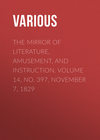Read the book: «The Mirror of Literature, Amusement, and Instruction. Volume 14, No. 397, November 7, 1829», page 7
FASHIONABLE NOVELS
It is well that hard words break no bones, else two or three gentlemen of literary notoriety would be in a sorry plight after reading the following passage in a recent Magazine. We stand by, and like the fellow in the play, bite our thumb:—
"Surely, surely, all men, women, and children, not cursed with the fatuity that would become a vice-president of the Phrenological Society, must by this time be about heartsick of what are called Novels of Fashionable Life. Only two men of any pretensions to superiority of talent have had part in the uproarious manufacture of this ware, that has been dinned in our ears by trumpet after trumpet, during the last six or seven years. Mr. Theodore Hook began the business—a man of such strong native sense and thorough knowledge of the world as it is, that we cannot doubt the coxcombry which has drawn so much derision on his sayings and doings was all, to use a phrase which he himself has brought into fashion, humbug. He could not cast his keen eyes over any considerable circle of society in this country, without perceiving the melancholy fact, that the British nation labours under a universal mania for gentility—all the world hurrying and bustling in the same idle chase—good honest squires and baronets, with pedigrees of a thousand years, and estates of ten thousand acres—ay, and even noble lords—yea, the noblest of the noble themselves (or at least their ladies), rendered fidgety and uncomfortable by the circumstance of their not somehow or other belonging to one particular little circle in London. Comely round-paunched parsons and squireens, again, all over the land, eating the bread of bitterness, and drinking the waters of sorrow, because they are, or think they are, tipt the cold shoulder by these same honest squires and baronets, &c. &c. &c. who, excluded from Almack's, in their own fair turn and rural sphere enact nevertheless, with much success, the part of exclusives—and so downwards—down to the very verge of dirty linen. The obvious facility of practising lucratively on this prevailing folly—of raising 700l., 1000l., or 1500l. per series, merely by cramming the mouths of the asinine with mock-majestic details of fine life—this found favour with an indolent no less than sagacious humorist; and the fatal example was set. Hence the vile and most vulgar pawings of such miserables as Messrs. Vivian Grey and "The Roué"—creatures who betray in every page, which they stuff full of Marquess and My Lady, that their own manners are as gross as they make it their boast to show their morals. Hence, some two or three pegs higher, and not more, are such very very fine scoundrels as the Pelhams, &c.; shallow, watery-brained, ill-taught, effeminate dandies—animals destitute apparently of one touch of real manhood, or of real passion—cold, systematic, deliberate debauchees, withal—seducers, God wot! and duellists, and, above all, philosophers! How could any human being be gulled by such flimsy devices as these?
"These gentry form a sort of cross between the Theodorian breed of novel and the Wardish—the extravagantly overrated—the heavy, imbecile, pointless, but still well-written, sensible, and, we may even add, not disagreeable, Tremaine and De Vere. The second of these books was a mere rifacimento of the first; and, fortunately for what remained of his reputation, Mr. Robert Ward has made no third attempt. He has much to answer for; e.g. if we were called upon to point out the most disgusting abomination to be found in the whole range of contemporary literature, we have no hesitation in saying we should feel it our duty to lay our finger on the Bolingbroke-Balaam of that last and worst of an insufferable charlatan's productions—Devereux.
BRUSSELS IN 1829
For the education of youth of both sexes, Brussels is one of the best stations on the continent, and is a good temporary residence for Englishmen whose means are limited. The country is plentiful, and consequently every article of living moderate. It is near England, the government is mild, and there is no restraint in importing English books, though their own press is any thing but free.
The population of Brussels is rated at nearly 100,000, of which above 20,000 are paupers, supported by the government and voluntary contributions. The population is rapidly increasing. The number of foreigners in the winter of 1828 was between seven and eight thousand, of which half the number were English. Many families settle for a season, and take their flight south, or return home in June; but the greatest number are stationary for the education of their children. An English clergyman, formerly a teacher at Harrow, has an establishment for boys, well conducted, and the expense does not exceed fifty guineas a year. There are several seminaries for girls, also superintended by Englishwomen, with French teachers. Masters in every department are excellent, so that few places afford better schools for education.
The air in the upper part of the city is salubrious, and the climate, perhaps, better on the whole than England; but the winters are sharper, and the summers hotter; fogs are less frequent, and the spring generally sets in a fortnight earlier than in any part of Great Britain.
Our countrymen will be disappointed who settle in Brussels as a place of amusement, for no capital can be more dull; and the natives are not ready of access, which is probably as much the fault of their visitors as themselves. As a station for economy, it can be highly recommended, provided no trust is put in servants, and every thing is paid for with ready money. The writer of this article resided in Brussels for a dozen years, and he knows this from experience. If an establishment, large or small, is well regulated, a saving of fifty per cent, may be made, certainly, in housekeeping, compared with London. House-rent is dearer in proportion with other articles of living, and the taxes are daily augmenting. The horse-tax is more than double that of England; and the king of the Netherlands can boast that he is the only sovereign in Europe who has a tax on female labour. William Pitt attempted a similar measure, but was mobbed by the housemaids, and abandoned it.—New Monthly Magazine.
The Gatherer
A snapper up of unconsidered trifles.
SHAKSPEARE.
CURIOUS DISCOVERY OF A ROBBERY
Lysons in his "Environs of London," says, "In a room adjoining to the south-side of the saloon, in the manor-house, at Charlton, in Kent, is a chimney-piece, with a slab of black marble so finely polished, that Lord Downe is said to have seen in it a robbery committed on Blackheath; the tradition adds, that he sent out his servants, who apprehended the thieves." Dr. Plot makes the story more marvellous, by laying the scene of the robbery at Shooter's Hill; he also says, "Thus in a chimney-piece at Beauvoir Castle, might be seen the city and cathedral of Lincoln, and in another at Wilton, the city and cathedral of Sarum."
P.T.W.
"VERY BAD."
A tyro interrogating a classical wag on the labours and sufferings of Homer, was shown the Iliad, and told that it was composed under great deprivation. Pointing to the edition, he inquired, if that was all the Iliad; to which he received as answer, that that was not all the ill he had, as Homer was obliged to sing it, to procure a little bread.
EPIGRAM
Young Sloeleaves vaunting he could trace
His line to Julius Caesar,
Was gall'd to hear a wag exclaim,
"The Celtae, if you please, Sir!"
Q IN THE CORNER.
Inscription over the Hive public-house, in Snargate Street, Dovor
Within this Hive
We're all alive,
Good liquors make us funny,
If you are dry,
Step in and try
The flavour of our honey.
SOVEREIGNS AND GUINEAS,
And the reigns in which they have been coined

EPIGRAMS ON THE FEES DEMANDED FOR SEEING WESTMINSTER ABBEY
Dame Godly desired the Abbey to view,
Admittance, one sixpence, demanded the clerk,
Which modest request in astonishment wrapt her,
How long will you such imposition pursue?
Faith ma'am, as to that we are left in the dark,
But I think, for my part, to the end of the Chapter.6
Down with your cash, the Verger cries,
How mean'st thou this? John Bull replies,
What law protects th' extortion?
Stop, gentle friend—what's law to us?
The law's your own—so make no fuss,
The profits are our portion.
Poets and prophets 'mongst the ancient Romans
Were deemed the same, and this our pockets rue,
For on this creed is built our sacred showman's,
Who has his poets and his profits too.




















